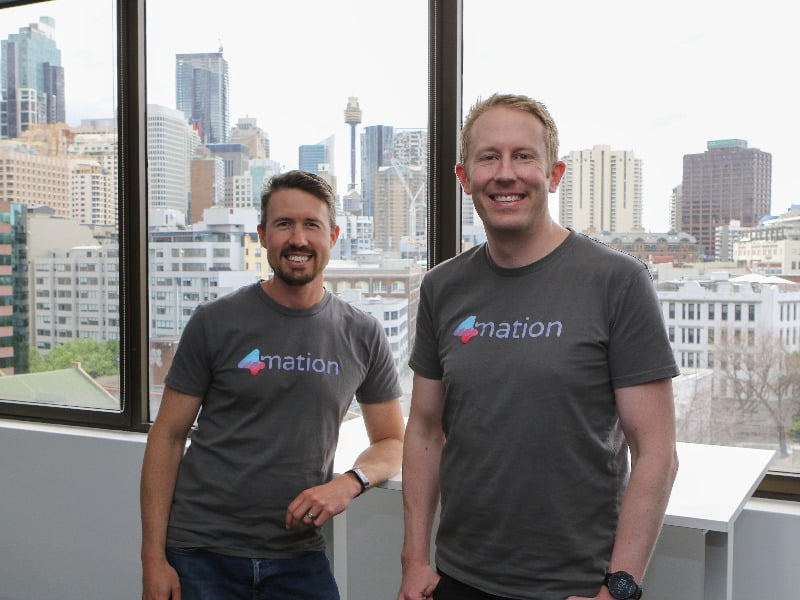Much has changed in the software development game since 4mation entered the scene at the turn of the century, with software companies faced with a range of diverse challenges. However, the search for qualified and properly trained professionals to work on tech projects has remained a constant challenge.
4mation chief executive Dane Eldridge and Scott Morris, head of team augmentation, are two developers who have prospered within the Australian technology scene through the last two decades.
Both have been with 4mation since the company came into being in 2001, a period of major global technological and geopolitical disruption. To set the scene, in 2001, the dotcom bust was in full swing and many tech companies, especially web startups were crashing in a heap souring the image of otherwise worthy tech firms.
The Y2K bug panic had come and gone with little impact on daily life as December 31, 1999 turned into January 1, 2000, leaving many wondering what all the fuss was about.

4mation began in a Sydney home office as Mr Eldridge and Mr Morris completed their computer science degrees. Both had watched and learned from the mistakes of the swarm of dotcom failures.
Right from the outset, 4mation took a steady rather than big-bang approach to company growth.
“We made the choice to grow deliberately and more slowly than other companies, because the focus was on long term success,” says Mr Eldridge
“We saw a lot of other companies spike in growth only to disappear 12 months later whereas we recently celebrated our 19th year in business.”
The pair had also watched the numerous failures of big IT projects during the nineties and were determined not to repeat what they saw as elementary mistakes in project management.
“We would often hear about these massive IT projects blowing out to huge budgets and going off the rails. We were at uni learning software development and it didn’t seem that hard. So we thought we could do that and jumped in with both feet,” says Mr Morris.
A lack of bang for the buck from tech projects in the early 2000s bothered the 4mation founders, even with projects that were technically successful. Tech vendor marketing appeared to be triumphing over value for money.
“The projects seemed to be incredibly expensive for what they were,” says Mr Eldridge. “The common thread was a lack of value and a lack of transparency from big vendors who used buzzwords and razzle dazzle to blind some clients.”
One of the biggest changes in how software development is done now compared to twenty years ago is the shift from the big-bang, all-in project to a more agile, continuous improvement approach.
“It’s the shift from traditional waterfall projects, to agile projects,” says Mr Eldridge. “Deploying regular releases, getting valuable user feedback and then adapting, rather than making all the decisions up front. Digital transformation is no longer a project. It’s a constant innovation process.”
The advent of the devops approach where developers manage the integration of both hardware and software is one of the biggest changes Mr Morris has seen in the tech development game over the last two decades.
“Back then you would be doing big-bang releases to physical servers. These days it’s a more rigorous process with managed builds, automated deployments to fleets of virtualized containers. There’s a lot more certainty now from that improved process” says Mr Morris.
Aside from the big changes in tech project management the 4mation pair have worked through and adapted to the rise of cloud computing, the widespread surge in smart, mobile devices and the disruptive force of open-source software invading what was once a far more proprietary tech world.
Projects are also incorporating more and more artificial intelligence and machine learning elements.
Email communication with team members has been replaced by Slack while the Atlassian development suite helps clients check progress through customised JIRA dashboards.
The most recent change has been the huge shift to remote working brought on by the COVID-19 pandemic.
COVID-19 has made the physical presence of staff in offices less important and led to a shift in 4mation’s business plans. The company had been using just Australia-based staff for its team augmentation business but recently added an offshore team augmentation option to support clients on tight budgets and a tech recruitment service to help clients find the right candidate amongst a market awash with job seekers.
Matching the right people to projects has not been made easy by Australia’s somewhat erratic 457 visa system where eligible job descriptions are often changed out of sync with the prevailing economy.
“457 visa holders have been an important part of the business,” says Mr Morris. “Looking back over the years, we’ve suffered a few headaches because of it being unpredictable and a bit of a black box.”
Mr Eldridge says making Australia more self-sufficient in producing local tech talent is key to the country ramping up its digital economy.
“I think there’s enormous potential for Australia to become a genuinely global tech leader. We need to produce sufficient volume of talent to really capitalize on that opportunity.”
A COVID relief pack from 4mation Technologies
In our 19 years in business, we’ve seen our share of challenging market conditions. With many businesses evaluating resources and reviewing budgets week to week, we’re here to help you thrive, in good times and bad. This quarter 4mation is offering a no minimum commitments on our services, and a COVID relief pack to businesses in need.
Do you know more? Contact James Riley via Email.
